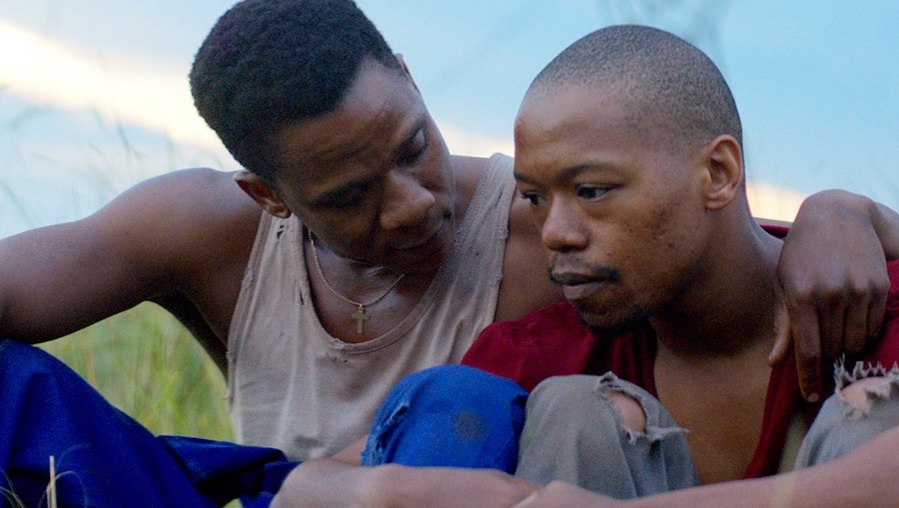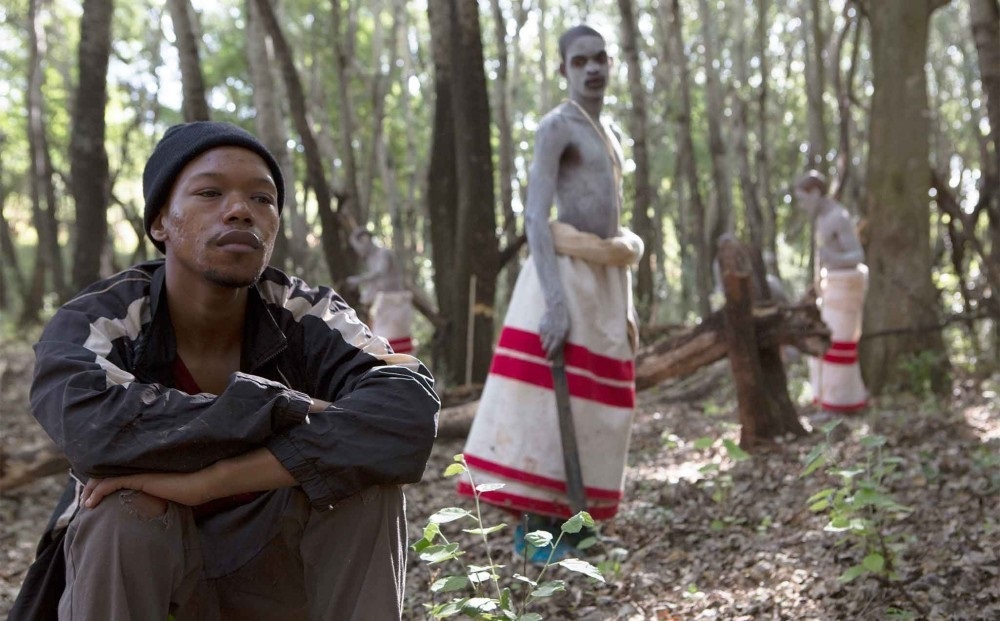The title of South African director John Trengove’s powerful first feature works in more ways than one. In its literal sense, it alludes to the ritual circumcision, or ukwaluka, that accompanies the traditional rite of passage for young Xhosa men, and the process of healing that follows. It’s a process that sees teenage “initiates” symbolically inducted into adulthood by older men, or “care-givers”, who have themselves previously been through the experience that they now oversee.
Traditionally shrouded in secrecy, descriptions of ukwaluka are rare, the best-known that in Nelson Mandela’s autobiography, Long Walk to Freedom, where it was presented in a positive light. That hasn’t always been matched in other contemporary accounts, which have recorded darker aspects to the experience, reflecting as it inevitably does on wider issues of masculinity in society. That Trengove, a white director who is by definition far removed from his subject, approached the subject at all proved controversial in his home territory, though his co-writers include novelist Thando Mgqolozana (who treated it in his 2009 A Man Who Is Not a Man).
Director John Trengove’s insight is so much more than anthropological
The Wound adds an extra dimension to this traditional story, with Trengove centring the human dimension of his film on three characters. It opens with Xolani (Nakhane Touré) at his warehouse job in Queenstown in the Eastern Cape province: we sense the contrast between the dull routine of this everyday working life and the retreat to which he travels in a mountainous, virtually subsistence world, and how it revives him, not least for the fact that he encounters friends from the past there.
It becomes clear that the bonds linking him to his childhood friend, now fellow care-giver, Vija (Bongile Mantsai), are far closer than they appear, giving the story an overtly queer accent – except Vija, who is married and has children, seems to treat his friend as little more than a casual sexual contact, while Xolani attaches greater significance to the time they spend together. There’s a quiet sadness in Xolani, a sense that the society in which he lives precludes him creating a role for himself that might accommodate his true character. Vija represses whatever feelings he may have for his friend, whom his own self-identity concerns prohibits from treating differently, except at rare moments (pictured below). It’s another sort of wound, one inherent in a world where this kind of love cannot be reconciled in any other way. If that sounds like the scenario for a South African Brokeback Mountain, the film’s third character, Kwanda (Niza Jay Ncoyini, pictured below, in background, with Nakhane Touré), disrupts such a dynamic. He comes from a wealthy family in distant Johannesburg, a city boy brought here by his father for the toughening up that the ukwaluka promises. It's not only his trainers that set Kwanda's urban modernity apart from his fellow initiates: Xolani, who has one-on-one responsibility for the youth, easily guesses that he’s different from them in his sexual orientation, too. Kwanda stands at one remove, allowing him a degree of scepticism about the proceedings of the ukwaluka rite (in which respect he surely shares something with Trengove as outsider-director), as well as an insight into what’s going on between the two older men. The Wound draws us into this increasingly uneasy three-sided configuration, one which festers – unlike the physical wound of circumcision, which heals – with dramatic inexorability.
If that sounds like the scenario for a South African Brokeback Mountain, the film’s third character, Kwanda (Niza Jay Ncoyini, pictured below, in background, with Nakhane Touré), disrupts such a dynamic. He comes from a wealthy family in distant Johannesburg, a city boy brought here by his father for the toughening up that the ukwaluka promises. It's not only his trainers that set Kwanda's urban modernity apart from his fellow initiates: Xolani, who has one-on-one responsibility for the youth, easily guesses that he’s different from them in his sexual orientation, too. Kwanda stands at one remove, allowing him a degree of scepticism about the proceedings of the ukwaluka rite (in which respect he surely shares something with Trengove as outsider-director), as well as an insight into what’s going on between the two older men. The Wound draws us into this increasingly uneasy three-sided configuration, one which festers – unlike the physical wound of circumcision, which heals – with dramatic inexorability.
But such a bare outline does little to convey the subtlety of Trengove’s film. The director is so receptive to the power of images and intonations over words, and his spare style comes close to that of Dogma in its fluid, frequently handheld camerawork (barring a couple of slow-motion sequences) and a rigorous avoidance of external effects (musical incursions are minimal).  There may be big landscapes aplenty in the surroundings, but Paul Özgür’s widescreen cinematography is memorable for its intimacy. Visual elements of Xhosa tradition – the contrasted colours of the initiates’ loincloths, their white body paint (main picture) – aren’t exaggerated, but the film engrosses us in its (for the great majority of its viewers, anyway) unfamiliar world. You guess that making the film must have been a broadly collaborative process, and Trengove’s insight is so much more than merely anthropological (though The Wound certainly feels true on that level, too). Most of all, he has drawn performances from his main trio that may seem at first understated, but in which his characters come to inhabit their roles absolutely. Pared down almost to silence by the end, Nakhane Touré as Xolani proves emphatically that less can be more. You could say exactly the same about the film as a whole: The Wound impresses for its raw, incremental power.
There may be big landscapes aplenty in the surroundings, but Paul Özgür’s widescreen cinematography is memorable for its intimacy. Visual elements of Xhosa tradition – the contrasted colours of the initiates’ loincloths, their white body paint (main picture) – aren’t exaggerated, but the film engrosses us in its (for the great majority of its viewers, anyway) unfamiliar world. You guess that making the film must have been a broadly collaborative process, and Trengove’s insight is so much more than merely anthropological (though The Wound certainly feels true on that level, too). Most of all, he has drawn performances from his main trio that may seem at first understated, but in which his characters come to inhabit their roles absolutely. Pared down almost to silence by the end, Nakhane Touré as Xolani proves emphatically that less can be more. You could say exactly the same about the film as a whole: The Wound impresses for its raw, incremental power.
Overleaf: watch the trailer for The Wound















Add comment